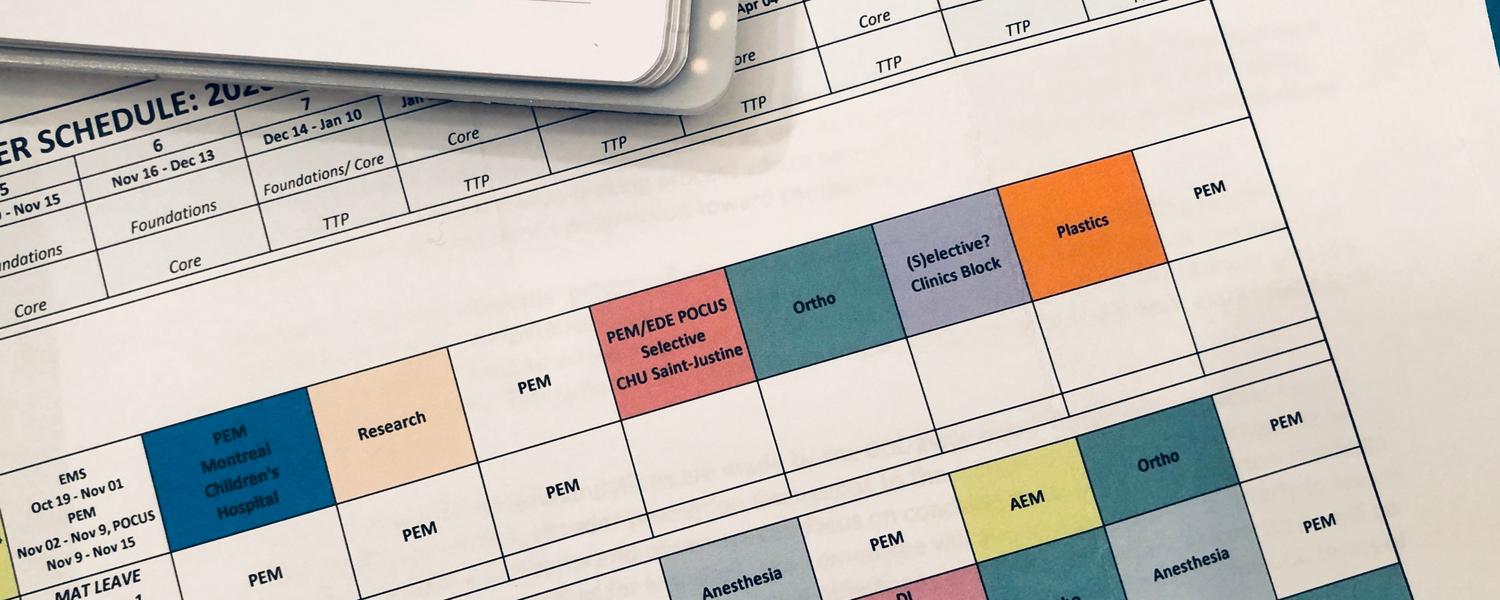
Clinical Curriculum
Our two year training program is based on the 2023 Royal College Pediatric Emergency Medicine Training Experiences.
Toxicology (1 block)
The Poison and Drug Information Service (PADIS) is based in Calgary. This service provides medical toxicological advice to physicians in three provinces. Opportunities are available to complete this rotation out of town if desired, at sites including the Bellevue Hospital in New York City.
Pediatric ICU (1 block)
A busy department with approximately 1000 admissions per year (60% medical, 40% surgical). Trainees get an opportunity to learn from experts in managing critically ill/injured patients with exposure to procedures and consults in the ED. Once PICU and anesthesia are successfully completed, fellows are approved for the ACH Transport Team, serving southern Alberta and parts of BC.
Pediatric Anesthesia (1 block)
Gain experience with endotracheal intubation, IV access, bag mask ventilation, LMA insertion, procedural sedation and pain management. Option to also learn about regional anesthesia.
Pediatric Orthopedics (1 block)
Focus on casting and fracture reductions, as well as follow-up; exposure provided through orthopedic clinics as well as call for ED consults; excellent teaching opportunities with orthopedic technicians as well
Diagnostic Imaging (0.5 block)
As of September 2023, the radiology rotation is comprised of 2-weeks of protected time to allow fellows to focus on the completion of ImageSIM modules. While ImageSIM access is given at the beginning of subspecialty residency, focused time is provided during this block to allow for more immersion.
PoCUS (0.5 block)
Residents without prior CanPoCUS IP certification will participate in KidSONO and Point-of-Care Ultrasound (PoCUS) activities longitudinally throughout the two years of subspecialty residency. They will also be given 2 weeks of dedicated time to focus on the completion of the KidSono modules.
EMS (Prehospital + Disaster Medicine) (0.5 block)
One 2-week block, often done longitudinally – provides excellent exposure to prehospital transport (ground and rotor wing transport) by participating in the ACH Transport Team, EMS ground ride-alongs, STARS (rotary wing air ambulance) ride-alongs, and on-shift phone consults with external sites consulting the ACH ED. Supplementary training in disaster medicine through academic programming as well as online learning also provided.
Pediatric Plastics (1 block)
Exposure through general plastics and hand clinics, home call, and opportunities to go to the OR.
Research (2 blocks)
Able to provide outstanding research support for our fellows with a 4-week intensive research training course, access to biostatisticians, epidemiologists, etc. Our division has a very active research group to mentor fellows along in their scholarly endeavours.
Administration (0.5 block)
Residents will participate in administrative, patient safety, and quality improvement activities longitudinally throughout their program. They will be given 2 weeks of protected time in their second year to complete the requirements of this rotation, though many of the activities will run throughout the 2-year curriculum.
Elective Options
Residents have two blocks designated for electives. They are encouraged to spend at least one Pediatric Emergency Medicine (PEM) elective block at a different hospital to explore diverse career opportunities and gain broader experience. Local elective blocks can include: child abuse, adolescent medicine, psychiatry, pediatric gynecology, pediatric surgery, pediatric neurosurgery, sports medicine, dermatology, ophthalmology, international electives, simulation based education, sports medicine, outpatient clinics, ultrasound, and research.
Curriculum Rotations | Residency Stream Specific
A couple of additional mandatory rotations differ based on the fellow's core residency background
Trainees with a Pediatrics Background
- Adult Trauma (1 block) – Adult trauma service at the Foothills Hospital. This rotation allows the fellows under the supervision of trauma surgeons to manage trauma in the ED, continue to the operating room as required and manage the patient during their entire hospital stay.
- Adult Emergency Medicine (1 block) – Completed primarily at the Foothills Emergency Department, a high volume, Level 1 trauma centre with an annual census of approximately 80,000. Effort is made to pair trainees with preceptors who work at the ACH ED who best understand the fellow's learning objectives.
Trainees with an Emergency Medicine Background
- NICU (1 block) – A novel rotation structure entails the first 2 weeks being spent at the Rockyview General Hospital Level 2 nursery for an introductory to general NICU medicine. The second 2 weeks will be spent at the ACH NICU which specializes in the care of neonates requireing subspecialty/surgical evaluation or neurocritical care.
- Pediatric Ambulatory Clinics (1 block) – The Alberta Children’s Hospital has a full range of subspecialty pediatrics outpatient clinics. Ambulatory rotations are constructed by the fellow and program director and are tailored to meet the specific needs of each fellow.
